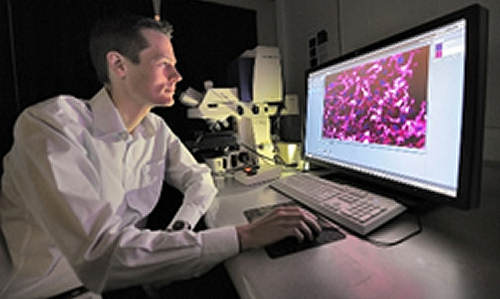Scientists from the University of Leeds have found a way to restore the function of damaged blood vessel repairing cells, in a potentially important step for the future treatment of heart disease.
Dr. Richard Cubbon Photo Credit: University of Leeds
The research, part-funded by the British Heart Foundation (BHF), could also pave the way for new targets for drug development in the fight against heart disease.
The findings have also identified a potential reason why South Asian men in the UK experience an increased risk of heart disease.
Led by Dr Richard Cubbon in the School of Medicine, the research team studied cells which can be grown in test tubes from routine blood samples (called outgrowth endothelial cells, or OEC), that can repair damaged blood vessels, or even form new ones.
Using a variety of experimental models which mimicked cardiovascular diseases, the researchers showed that cells grown from apparently healthy young South Asian men were effectively unable to repair damaged blood vessels or form new blood vessels in damaged tissues, compared to a matched control group of white European men.
The team then identified a protein, called Akt, known to be important in blood vessel formation, which was much less active in the South Asian men’s cells. By adding active Akt back into their OEC using specially-designed viruses, it was possible to completely restore the ability of these cells to repair vessels.
Dr Cubbon said: “Our work provides a proof of principle that it is possible to restore the blood vessel healing properties of cells, which might be suitable for use as a treatment.
“By understanding why Akt is less active in these cells, we may gain a better understanding of why South Asian men are prone to cardiovascular disease, and possibly find new targets for drug development.”
Dr Shannon Amoils, Senior Researcher Advisor at the BHF, which helped to fund the study, said: “We already know that people of South Asian ethnicity are at a higher risk of cardiovascular disease. In their latest study Dr Cubbon and his colleagues have found one possible reason for this increased risk. The study showed that cells involved in the repair of blood vessels may not work as well in some South Asian people because of low levels of proteins involved in the healing process.
“This research gives hope that in the future it may be possible to enhance blood vessel repair by targeting these proteins. Knowing how to improve blood supply could one day help to mend hearts damaged after a heart attack – the focus of our Mending Broken Hearts Appeal.”
Story Source:
The above story is based on materials provided by University of Leeds, Ben JONES.





